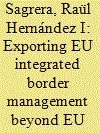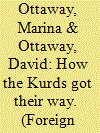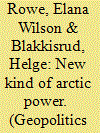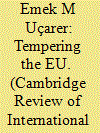|
|
|
Sort Order |
|
|
|
Items / Page
|
|
|
|
|
|
|
| Srl | Item |
| 1 |
ID:
129583


|
|
|
|
|
| Publication |
2014.
|
| Summary/Abstract |
External action has been of growing importance for the Union's Area of Freedom, Security and Justice (AFSJ) and accounted in 2011 already for over 19 per cent of all texts adopted by the Justice and Home Affairs Council. AFSJ related external action has also added a new dimension to previously existing fields of EU external relations. This article first considers the internal and external factors which have influenced the development the external side of the AFSJ and the impact of the post-Lisbon legal and institutional framework, including the special context created by the 'opt-outs' and coherence problems within this framework. It then provides a survey and analysis of the main forms of EU action in this domain (strategy formulation, cooperation with third countries, capacity-building and cooperation with and within international organizations) before assessing-in the conclusions-the implications of this external dimension for both the EU and the Member States and its future developments prospects.
|
|
|
|
|
|
|
|
|
|
|
|
|
|
|
|
| 2 |
ID:
129584


|
|
|
|
|
| Publication |
2014.
|
| Summary/Abstract |
The external dimension of European Union (EU) border management cooperation has recently been developed, in particular through the promotion of integrated border management (IBM). The European Commission has been keen to foster IBM, an attempt to reach EU standards in the absence of an EU common border service. Integrated border management is regulated under the Treaty of Lisbon, and the Stockholm Programme calls for its further development. This article analyses and compares the policy instruments promoting IBM standards beyond EU borders, namely the European Agency for Operational Cooperation at the External Border of the Member States of the EU (FRONTEX) (with the signature of Working Arrangements with the border services of third countries) and the activity of the EU Border Assistance Mission to the Republic of Moldova and to Ukraine (EUBAM) at the Ukrainian-Moldovan border. Moreover, it provides an empirical account of IBM activity carried out in the Eastern Partnership and Russia, and explains the reasons underlying the lack of IBM promotion in the southern Mediterranean countries.
|
|
|
|
|
|
|
|
|
|
|
|
|
|
|
|
| 3 |
ID:
130475


|
|
|
|
|
| Publication |
2014.
|
| Summary/Abstract |
The surge of ethnic and sectarian strife in Syria and across the Middle East has led a number of analysts to predict the coming breakup of many Arab states. This potential upending of the region's territorial order has come to be known as "the end of Sykes-Picot," a reference to the secret 1916 Anglo-French agreement to divide up the Middle Eastern provinces of the Ottoman Empire into British and French zones of control. Because the European treaties that created new Arab states in the aftermath of World War I upheld the outlines of that agreement, Sykes-Picot became the convenient shorthand for the map that colonial powers imposed on the region, one that has remained essentially constant to the present day.
With bloodshed from Aleppo to Baghdad to Beirut, it is indeed tempting to predict the violent demise of Sykes-Picot. But although the worst fighting is spilling over borders and pushing some countries, such as Syria, toward fragmentation, there is another force crossing national lines and even realigning national relationships: trade. New transnational zones of economic cooperation are making Middle Eastern borders more porous, but in a way that does not directly challenge existing states. Instead, mutual economic interests, especially in the oil and gas industries, may signal a softer end to Sykes-Picot.
|
|
|
|
|
|
|
|
|
|
|
|
|
|
|
|
| 4 |
ID:
129596


|
|
|
|
|
| Publication |
2014.
|
| Summary/Abstract |
The aim of this article is to examine what the geopolitics of the Arctic look like as seen from the largest Arctic state. How are narratives about the development of the region received, reworked and produced in a Russian context? We find that Russian policy actors distance themselves from discourses of Arctic conflict and geopolitical competition, and examine how this approach may serve some of Russia's key interests in the region. We further argue that the key tension in the Arctic region is not along the conflict/cooperation axis, but rather lies in the tricky process of delineating between international cooperation and national sovereignty in tackling Arctic problems. In attempting to illustrate the various voices, ideas and interests that shape Russia's policy understanding of the Arctic and its challenges and opportunities, we draw upon a media analysis and a set of qualitative interviews with representatives of the five Arctic states.
|
|
|
|
|
|
|
|
|
|
|
|
|
|
|
|
| 5 |
ID:
129582


|
|
|
|
|
| Publication |
2014.
|
| Summary/Abstract |
The European Union's (EU) area of Freedom, Security and Justice (AFSJ) portfolio comprises policy areas such as immigration and asylum, and police and judicial cooperation. Steps were taken to bring this field into the mandate of the EU first by the Maastricht Treaty, followed by changes implemented by the Amsterdam and Lisbon Treaties, the last one 'normalizing' the EU's erstwhile Third Pillar. As the emergent EU regime continues to consolidate in this field, NGOs of various kinds continue to seek to influence policy-making and implementation, with varying success. This article seeks to establish the context in which NGOs carry out their work and argues that the EU-NGO interface is impacted both by the institutional realities of the European Union and the capacities of EU-oriented NGOs to seize and expand opportunities for access and input into the policy cycle. Using EU instruments representing three different policy bundles in AFSJ (immigration, asylum and judicial cooperation in criminal matters), the article seeks to map out NGO strategies in engaging and oftentimes resisting European Union policy instruments.
|
|
|
|
|
|
|
|
|
|
|
|
|
|
|
|
|
|
|
|
|